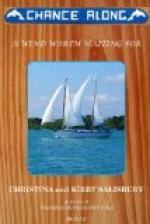CHAPTER XXII
Pierce Phillips possessed the average young American’s capacities for good or evil. Had he fallen among healthy surroundings upon his arrival at Dawson, in all probability he would have experienced a healthy growth. But, blown by the winds of chance, he took root where he dropped—in the low grounds. Since he possessed the youthful power of quick and vigorous adaptation, he assumed a color to match his environment. Of necessity this alteration was gradual; nevertheless, it was real; without knowing it he suffered a steady deterioration of moral fiber and a progressive change in ideals.
His new life was easy; hours at the Rialto were short and the pay was high. Inasmuch as the place was a playground where cares were forgotten, there was a wholly artificial atmosphere of gaiety and improvidence about it. When patrons won at the gambling-games, they promptly squandered their winnings at the bar and in the theater; when they lost, they cheerfully ignored their ill-fortune. Even the gamblers themselves shared this recklessness, this prodigality; they made much money; nevertheless, they were usually broke. Most of them drank quite as freely as did the customers.
This was not a temperance country. Although alcohol was not considered a food, it was none the less regarded as a prime essential of comfort and well-being. It was inevitable, therefore, that Pierce Phillips, a youth in his growing age, should adopt a good deal the same habits, as well as the same spirit and outlook, as the people with whom he came in daily contact.
Vice is erroneously considered hideous; it is supposed to have a visage so repulsive that the simplest stranger will shudder at sight of it and turn of his own accord to more attractive Virtue. If that were only true! More often than not it is the former that wears a smile and masquerades in agreeable forms, while the latter repels. This is true of the complex life of the city, where a man has landmarks and guide-posts of conduct to go by, and it is equally true of the less complicated life of the far frontier where he must blaze his own trail. Along with the strength and vigor and independence derived from the great outdoors, there comes also a freedom of individual conduct, an impatience at irksome restraints, that frequently offsets any benefits that accrue from such an environment.
So it was in Pierce’s case. He realized, subconsciously, that he was changing, had changed; on the whole, he was glad of it. It filled him with contemptuous amusement, for instance, to look back upon his old puritanical ideas. They seemed now very narrow, very immature, very impractical, and he was gratified at his broader vision. The most significant alteration, however, entirely escaped his notice. That alteration was one of outlook rather than of inlook. Bit by bit he had come to regard the general crowd—the miners,




